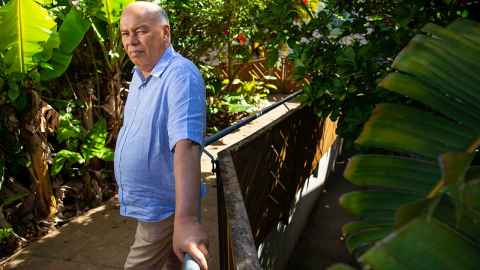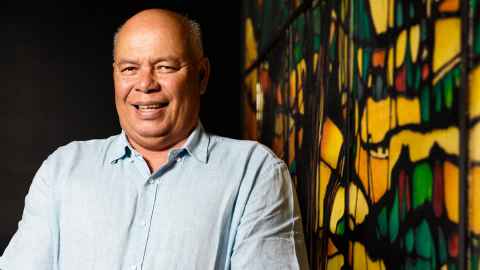Collin Tukuitonga: our Covid-19 message is clear
1 March 2021
Dr Collin Tukuitonga is trying to spread simple scientific health messages to Pacific communities and beyond.

Two things happened in March 2020. New Zealand went into a level four lockdown thanks to Covid-19 and Dr Collin Tukuitonga started a new job at the University of Auckland.
Talk about timing.
Collin, Associate Dean Pacific in the Faculty of Medical and Health Sciences, could not have predicted how his first few months, indeed year, would pan out.
The small matter of a pandemic and a worrying Covid-19 cluster in South Auckland meant he was called on to convey key Covid-19 messages to the Pacific community and the community in general.
“I’ve done a lot of work with the Ministry of Health. The dean has been generous in allowing me to do that. It’s been a full-on time.”
The work continued into late January when Collin headed to the Cook Islands as part of a Ministry delegation ensuring effective testing systems for the one-way quarantine-free travel deal set up with the realm nation. He says it makes sense it’s only one-way for now.
“Two-way is a bit more challenging because the Cook Islands health system is so small and fragile, and they don’t have the expertise that’s needed in the facilities, nor enough ventilators.”
Shortly after his return, Auckland was facing its own challenges again – this time around compliance.
“New Zealand has done well when we worked together and followed the advice,” Collin says. “Unfortunately, it appears that some are ignoring the advice to stay home until test results are available or when they are sick.
“We have seen the new cluster continue to bubble because people have not followed advice. I am asking them to do the right thing and stay home. We are in this together and the acts of a few put us all at risk.”
Collin says the Pacific community is vulnerable to misinformation and conspiracy theories and he has had his work cut out countering these.
“There’s also a tendency to accept that natural things are better than medicines. I guess that’s a human thing. We have a Pasifika Medical Association, where doctors and nurses of Pacific heritage share information – so a Fijian doctor will do a Fijian session and a Samoan doctor a Samoan session. It’s important to do this.”
New Zealand has done well when we worked together and followed the advice.
Prior to joining the University, Collin had spent six years as director-general of the Pacific Community (SPC) in New Caledonia. Other roles include past director of public health at the Ministry of Health and working for the World Health Organisation in Switzerland, in the area of non-communicable diseases and child health.
“Now I’m on the Ministry of Health’s Technical Advisory Group for Covid-19 and chair a Pacific expert group for the Associate Minister of Health. I also do one day a week with the Heart Foundation.”
The fact that he’s such a good communicator means the former GP is called on a lot by the media. So how did he get so good at explaining complex health issues?
“When I was at the Ministry of Health there was a former Dominion Post journalist working there as a communications adviser. She put me through a training programme – at that time it was all about SARS. As director of public health, I needed to explain that virus. Before that, I was just a clinical person and I didn’t really have a public profile.”
He says conveying important health concepts simply is the key.
“I try to be clear and straightforward and break down all the scientific jargon into language that people can understand.
“Science is a mystery to many people and scientists don’t really help because they often create that mystique. They give an impression that science is this ‘big special concept’ that only certain people have access to.
“Science is a tool and is just one of the tools we have. I have a lot of interest in translating research into policy.
“Sir Peter Gluckman is probably the lead in this area where he tries to communicate science in simple terms, to policymakers or to the media.
“I think all scientists have that responsibility.”
Collin routinely meets with Pacific community groups to give talks, including in his mother tongue, Niuean.
“They want to know, ‘am I going to be safe? Am I going to get this disease? Would my grandma die? And all of that. One of the first things I did when Covid-19 broke out here, was go on Pacific radio. They love radio and I can use the Niue language or English. I’ve been on TV’s Tagata Pasifika and RNZ to explain it in English, because if they’re Niuean and under 30 years old, chances are they only speak English.
“I also record short messages on my phone and stick them on Facebook or Twitter. It’s very amateurish, but people like it.”
I try to be clear and straightforward and break down all the scientific jargon into language that people can understand.

Collin is keen to promote the study of medical health sciences to the Pacific community. He says many students are deterred from medicine as a career path if they don’t qualify for med school.
“We have enthusiastic young people who try for med school without having done the sciences. We need to prepare them better.
“I’m impressed with what’s happened with Māori students through a programme called Whakapiki Ake where University of Auckland staff go into schools and the community to talk to families and explain about our health programme.
The aim is to ensure these young ones do the sciences, starting in year nine.
“Whakapiki Ake has led to a growth in numbers of Māori in medicine but there’s nothing like that for Pacific Island students and that’s one of the things I want to help set up ... where we work with young people, their families, and the people who influence their decision-making, to ensure they’re as prepared as they possibly can be before they come to us.”
We have enthusiastic young people who try for med school without having done the sciences. We need to prepare them better.
He says the other message he’d like to convey is that the medical profession is crying out for Pacific representation in other vocations.
“That’s why it’s important they get the right guidance early on at school.
“Say, for example, a student wants to do medicine but they’re perhaps not strong enough academically. They’re more likely to be told at school, ‘I think you’d better look at something else’ rather than trying to work with that young person to see how far they can get.
“Medicine isn’t going to be for everyone but we have shortages in pharmacy, nursing, audiology, optometry and these are equally valuable and important professions. We don’t have many young Pacific people in pharmacy at all because they’re not being adequately informed and guided, and their parents may want them to try to get into medicine. If they don’t, they just disappear.
Collin is working with the University's Pro Vice-Chancellor Pacific, Damon Salesa, and also Rennie Atfield-Douglas from the South Auckland campus Te Tai Tonga, to boost this awareness.
“We need to let them know there’s a worthwhile career in so many other areas of healthcare.”
Denise Montgomery
This profile of Dr Collin Tukuitonga first appeared in the March 2021 UniNews magazine.
Email: uninews@auckland.ac.nz